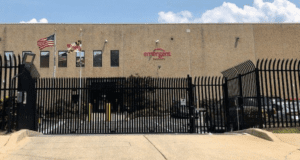
What Startups Say About the Maryland Biotech Investment Tax Credit and Why You Should Care
With a new application cycle, the Biotech Investment Tax Credit program has also gotten a makeover to improve the application process and increase access.
By Sam Hopkins | October 11, 2023
| BioBuzz has been connecting the life science workforce since 2009. We’ve built an expansive community in the Mid-Atlantic with a national readership that spans from Massachusettes to Florida, and New York to California. For our next chapter, we’re building a proprietary talent logistics model to help employers source and hire life science talent. Learn more. |
Football season has just begun, but entrepreneurship is a year-round contact sport.
Startup support is a competitive game from region to region as localities and industry organizations woo bio-entrepreneurs. Interestingly, state officials are focused on making the process less bureaucratic and cutthroat, so innovators don’t self-select out of a process that could bring real benefits to them and the broader ecosystem.
The Maryland Biotechnology Investment Incentive Tax Credit (BIITC), pronounced bit-see, is emblematic of Maryland’s efforts to promote and support life science ecosystem development in the state. The program has evolved over the years to be responsive to a growing community of entrepreneurs and investors. Companies may clash as competitors down the road, but the state wants to help them get off to a positive start.
“BIITC is one of our signature programs, intended to make it easier for Maryland biotechnology companies to raise private funds,” said Ulyana Desiderio, Director, Life Sciences, Maryland Department of Commerce. “We’ve listened to the life sciences and investor communities and made some important changes to the program to spread the love and ensure more companies and investors can benefit from it.”
The current application cycle is now open and we interviewed several professionals whose companies were helped by the program–talking to them about its promise, progress, and remaining potential for improvement, with a special focus on Frederick, MD companies, and incubators.
Through BIITC, Desiderio says, “Every dollar invested in a Maryland company that qualifies for this program, will go that much farther because it is backed up by the State of Maryland.” The goal is to get investors to take a closer look at cutting-edge companies and technologies just beyond the funders’ risk appetite.
Breaking Down BIITC
So what kick does BIITC provide? From the program’s webpage:
BIITC provides an income tax credit equal to 33% of an eligible investment in a Qualified Maryland Biotechnology Company (QMBC) up to $250,000 in tax credits, or 50% of an eligible investment in a QMBC up to $500,000 in tax credits if the QMBC is located in Allegany, Dorchester, Garrett or Somerset County.
In qualified Opportunity Zones, the credit can total up to 75% of the investment, and the overall stacked structure of the tax credit is aimed at attracting investors by offsetting a certain amount of their investment in a qualifying company, and focusing those investors on company attributes that align with economic development goals.
BIITC builds on Maryland’s solid and enviable foundation of world-class institutions, helping to bring more benefits to humanity from the lab bench to the patient bedside. Economic benefits ripple out as the people who build companies build their lives. The dividends accrue to schools and children who see positive role models and clear, updated career paths, momentum for improved transit options, places to eat, and more.
Ecphora Capital’s Deborah Hemingway sees BIITC as helping to counteract the magnetism of other metro areas. “Without this program, our startups are drawn to other areas where startup support is stronger,” she says.
Based in Baltimore, Ecphora has made BIITC a major part of its strategy. However, she says that the program’s current funding level is so limited that the program is perhaps more competitive than it needs to be, in light of its mandate to help early-stage companies. “By raising the amount of funding in the program, we will be able to further support our startups and further strengthen our economy,” Hemingway adds. She lists retaining local innovation, boosting job creation, and widespread economic benefits as hallmark achievements of BIITC.
Around all parts of the state, BIITC has big believers who are also pushing for improvement in the way the program runs.
American Gene Technologies (AGT), a clinical stage gene therapy company in Rockville, has aggressively raised money to fuel AGT’s growth and HIV Cure program. AGT CEO, Jeff Galvin shared with MD Department of Commerce that the tax credit has been invaluable as it provides investors with income tax credits equal to 50 percent of an eligible investment in the company. “Once we learned to use that, that was a very important program for us,” Galvin said. “It helped us raise a lot of money. And it helped us to expand and stay on this track.”
Kathie Callahan Brady, CEO of the Frederick Innovative Technology Center (FITCI), is one leader who has helped to scale the use of the program to add juice to companies she knows well.
FITCI has helped 74 companies, with a 93% success rate defined as achieving sales, and 97% of the incubator/accelerator’s firms are raising funds, including non-dilutive grant funding and private investment. As Brady works with companies to define and refine their go-to-market strategy and value proposition, she also works with them on locating funding. Investor incentives of all types are part of the mix of tools she advises on, but “Getting the tax credit is tough,” she says, “and many of the investors don’t even know about BIITC.” By most accounts, those who do know, move quickly.
Improving the Process
Jon Davis, President of Frederick’s Akonni Biosystems, says that the tax credit helped Akonni raise $30 million in investments over a 12-year period. Nevertheless, he and others interviewed have shared that submitting a BIITC application in past years was arduous to navigate.
With this in mind, Department of Commerce officials have continued to improve the process, making enhancements to the program to address challenges and take in feedback from the community of companies and investors, boosting equitable access to BIITC incentives as the program moves forward. Investors seeking to participate in this new application cycle will have fewer hurdles to navigate and a much better BIITC experience.
Dr. Jeffrey Hausfeld, Chairman and Chief Medical Officer of BioFactura, a Frederick-based biomanufacturer, says that BIITC mitigates risk and attracts new investors to new ventures and technologies that carry a higher degree of risk than what might otherwise be comfortable. “I used it at BioFactura for several years in the company’s earlier years,” Hausfeld says. “It’s an excellent tool for young companies to use to attract new investors and make them feel like they’re really getting the biggest bang for their buck.” Dr. Hausfeld was the fourth employee at BioFactura, and the company now has 43 on staff and continues to grow.
Maryland has an array of incentives to benefit companies throughout the growth cycle, also administered by the Department of Commerce.
These include:
- ExportMD – supports companies’ international marketing efforts, including participating in delegations and trade missions, market research, and more.
- Partnership for Workforce Quality – matches employer costs for employee training, including quality management systems and other technical and process skills that help companies and provide lasting benefits to workers.
- Manufacturing 4.0 – supports the modernization of manufacturing facilities. Last year was the first year of the program and there were no life sciences recipients, so those companies are encouraged to apply.
- The state also provides scholarships and promotional opportunities for companies at domestic conferences such as BIO and MedTech and provides meeting space at JP Morgan. Under ExportMD, the state has taken companies to BioJapan, MEDICA, and Arab Health
The Personal Touch
Sue Carr, of CarrTech, which makes an all-in-one needle and filter device, said that most of her company’s Maryland-based investors were aware of BIITC and were all on board with pursuing the credits.
Those out of state might find the process of getting money back to be slower, which is another noted point of program improvement. “I don’t think we would have raised as much money as we did, without having Maryland back us. Maryland recognizes that too, and they see that when your company is thriving and growing, they pay it forward.” That includes opportunities like funding trips to conferences like BIO and The MedTech Conference to promote the company, as stated above. “I’ve grown close to a lot of folks at the Maryland Department of Commerce,” Carr says.
BIITC is administered by the Office of Finance Programs at the Department of Commerce which looks to provide assistance to all interested in the program. In addition, the Office of Life Sciences team, Ulyana Desiderio, Stefanie Trop and Matt Cimino, are happy to help companies navigate this program for either current or future rounds of funding.
- About the Author
- Latest Posts
Sam Hopkins has spent the past decade in the Baltimore area life-science and healthcare ecosystem, including roles at Johns Hopkins, the University of Maryland, the U.S. Army, and early-stage companies. He spent the previous decade as a journalist, which saw him cover everything from clean energy conferences in Morocco, to Soviet-era Estonian rock’n’roll, to trailblazing CEOs in Timonium. Sam is an avid athlete and coach, and he lives with his wife and two sons in Baltimore’s Oakenshawe neighborhood. You can often find him around town spinning records as DJ Balagan, or performing in musical groups Sink and South of Boundary.







